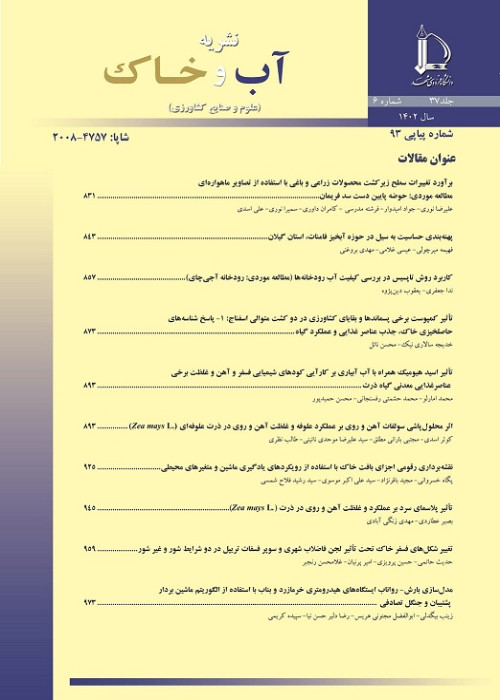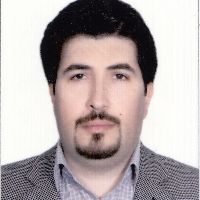Effect of Different Agronomic Management on Some Physical Indicators of Soil Quality
Author(s):
Article Type:
Research/Original Article (دارای رتبه معتبر)
Abstract:
Introduction
Soil is one of the renewable natural resources that take a long time to get renewed; its destruction or conservation depends on how land is used and managed. Soil quality refers to soil capacity in maintaining biological fertility, sustainability in plant production and yield. Maintaining soil quality is essential for sustainable food production and decomposition of organic wastes. Different agronomic managements have various effects on soil quality indicators. There are few published researches about the effect of various agronomic managements on soil quality indices in arid and semi-arid regions (such as Iran). Therefore, this study was conducted to investigate and compare the effects of three different agronomic management including crop rotation-crop residue removal, monoculture-crop residue removal and monoculture-crop residue retention systems on some physical indicators of soil quality.
Materials and Methods
In this research, three farms with three crop management systems including crop rotation-crop residue removal, monoculture-crop residue removal and monoculture-crop residue retention (10 ton per hectare) systems were investigated. In the monoculture-crop residue removal treatment, wheat was continuously cultivated for 8 years. In the rotation-crop residue removal system, wheat - mung bean were cultivated in rotation for 2 years. For the monoculture-crop residue retention system, wheat was planted for 10 years, after which the post-harvest residues were mixed with topsoil (0-15 cm). One hundred twenty soil samples (40 samples from each field) were prepared by systematic sampling from 0 to 15 cm depth. In order to investigate the effect of different agronomic management on soil physical quality, some indicators including soil organic matter, total porosity, bulk density, mean weight diameter of aggregates, aggregate stability, available water capacity, penetration resistance, saturated hydraulic conductivity, and slope of retention curve at inflection point (S-index) were measured. The experiment was conducted in a randomized complete block design with four replications. Also, the mean comparison was performed using Duncan's multiple range test.
Results and Discussion
The results of analysis of variance showed that the type of crop management had a significant effect (p<0.01) on organic matter, total porosity, bulk density, mean weight diameter of aggregates, aggregate stability, available water capacity, penetration resistance, saturated hydraulic conductivity and S-index. The results of mean comparison indicated that the monoculture-crop residue removal system resulted in a significant increase in bulk density (1.31 g cm-3) and soil penetration resistance (0.4 MPa) than other systems, while the highest organic matter content (1.038 %), porosity (55.7%), mean weight diameter (1.04 mm), aggregate stability index (28%), available water capacity (0.15%), saturated hydraulic conductivity (46.17 cm h-1) and S-index (0.053) was observed in the monoculture-crop residue retention system. The most measured values for soil quality indicators were more in monoculture-crop residual retention system compared with the other treatments. The amount of S-index of soils under monoculture-crop residual retention, crop rotation-crop residues removal, and monoculture-crop residual removal systems were 0.053, 0.032 and 0.019, respectively. The high S-index value of soil under monoculture-crop residual retention system can be attributed to its suitable amount of soil organic carbon and better soil structural quality. By contrast, in monoculture-crop residue removal system, elimination of organic matter had undesirable effect on soil porosity, and aggregate stability. Furthermore, the S-index values of the soils under crop rotation-crop residues removal, and monoculture-crop residual removal systems are below the Dexter’s soil quality index threshold (0.035); therefore, the results indicated that the soils are degraded.
Conclusion
The results of this study showed that crop management plays an important role in changing soil physical quality indicators. Among the studied crop managements, monoculture-crop residue retention management system showed more positive effects on soil physical parameters than the others. Retention of crop residues on soil surface increases the soil organic matter which in turn has positive effects on soil properties such as aggregate stability, saturated hydraulic conductivity, available water content and slope of retention curve at the inflection point. On the other hand, the monoculture-crop reside removal treatment, with less soil organic matter, had more undesirable effects on agronomic soils than other treatments. Based on the results, the effect of different agronomic management systems on improving soil physical quality indexes was in the following order: monoculture-crop residue retention >crop rotation-crop residue removal > monoculture-crop residue removal. According to the results, it can be concluded that soil organic matter is the central index of soil quality, which is intensely influenced by crop management system. Therefore, in arid and semiarid areas such as Iran, monitoring of the long-time effect of agronomic management on status of soil organic matter and soil physical indices is urgent.Keywords:
Language:
Persian
Published:
Journal of water and soil, Volume:33 Issue: 2, 2019
Pages:
275 to 288
magiran.com/p2004632
دانلود و مطالعه متن این مقاله با یکی از روشهای زیر امکان پذیر است:
اشتراک شخصی
با عضویت و پرداخت آنلاین حق اشتراک یکساله به مبلغ 1,390,000ريال میتوانید 70 عنوان مطلب دانلود کنید!
اشتراک سازمانی
به کتابخانه دانشگاه یا محل کار خود پیشنهاد کنید تا اشتراک سازمانی این پایگاه را برای دسترسی نامحدود همه کاربران به متن مطالب تهیه نمایند!
توجه!
- حق عضویت دریافتی صرف حمایت از نشریات عضو و نگهداری، تکمیل و توسعه مگیران میشود.
- پرداخت حق اشتراک و دانلود مقالات اجازه بازنشر آن در سایر رسانههای چاپی و دیجیتال را به کاربر نمیدهد.
In order to view content subscription is required
Personal subscription
Subscribe magiran.com for 70 € euros via PayPal and download 70 articles during a year.
Organization subscription
Please contact us to subscribe your university or library for unlimited access!



